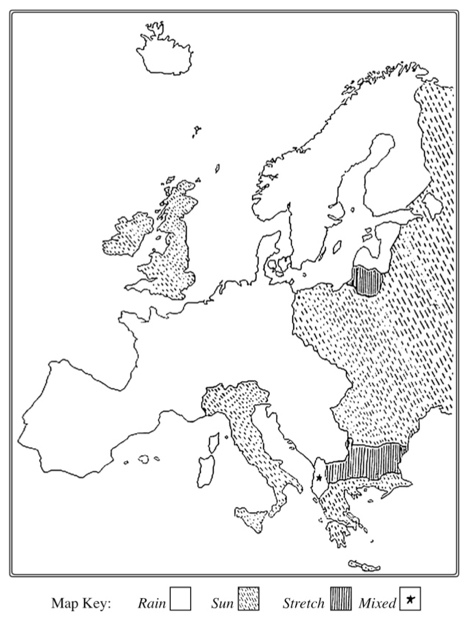| πολλὰ τὰ δεινὰ κοὐδὲν ὀμπρέλλας δεινότερον πέλει |
| ‘There are many wonderful things, and nothing is more wonderful |
|
than an umbrella.’ |
It is well-known that several unsuccessful attempts have been made to classify the languages of the European continent. One early scheme sorted them according to the words for ‘God’, resulting in deus-, bog- and gott-languages. An equally silly idea was advanced in the last century, in which imaginary sounds like k̂ and kw were postulated, producing obscure divisions into centum- and satem-languages. This latter approach was exploited in the heyday of comparative philology by rascals such as Bopp and Grassmann, who tried to convince us through this trickery that pairs like Slovene devet and English nine, or Slovak pät’ and English five, are related--even though they share not a single letter!
Modern linguistic science has reached the stage where such groping solutions can be dispensed with, and a new, purely data-driven approach be applied to analyze the material at hand. Obviously, in analyzing modern languages, only modern vocabulary will do--yet, since not all European cultures have reached the same level of technical development, one must exercise caution in selecting vocabulary. After a great deal of research, it was finally decided that the first bold stroke would be made with the word for ‘umbrella’.2
Examining the data, we find that there are but three groups of European languages: those which derive the word for umbrella from a root meaning ‘to stretch’, those which derive from a root for ‘rain’, and those which derive from a root meaning ‘sun’ or ‘shadow’.
While the first two categories are hardly surprising--after all, an umbrella is stretched over one’s head to protect it from the rain--it at first seems odd that a language would designate an instrument used to protect one from the rain by making reference to the sun. This, however, can be explained by the well-known principle of lūcus ā nōn lūcēndo:3 it is precisely because there is so little sun when it rains that the word for ‘umbrella’ should be derived from the word for sun.
The excellent map below shows the distribution of the three groups of languages.

Note that some puzzling issues are raised by the distribution of the languages. First, the stretch languages are represented by Lithuanian skėtis, Bulgarian чадър and Macedonian чадор. This indicates that the original European word for ‘umbrella’ was based on a root meaning stretch, for in no other way could these languages, obviously akin, be so separated. From the map, it can be seen that there has been a two-phased assault on the original term. First the root sun swept across the European continent, obliterating the root stretch in all but the most remote areas. That this process of encroachment continues is seen by the fact that Albanian, once a pure stretch language, has now acquired a second word for umbrella, so that one may say either ombrellë or çadër. Then a newer innovation, representing the root rain appeared4--thus the isolation of Italy and the British Isles. In the latter only Cornish, with its glawlen, continues to bravely hold out... unaware, however, that it already sold out long ago by abandoning the root stretch!
The prospects are truly alarming, for they suggest an imminent reshuffling of the consanguinity of the European languages. The author urges all to be vigilant and to report any evidence of future semantic shift to the editorial staff of Speculative Grammarian.
_________________________
Notes:
1 First draft, now unfortunately lost.
2 Even here one must exercise caution! For Lapp arvesyeiji designates any protection from rain, though it be a simple tree.
3 Thus Latin lūcus ‘grove of (sacred) trees’ < lūx ‘light’, because there is no light there, and bellum ‘war’ < bellus ‘pretty’, precisely because war is not pretty.
4 Alternatively, the root rain may have been the original and sun may be making headway by cleverly taking sea routes to circumvent the more daunting passage by land. If this be the case, the prospects are truly alarming, for it would appear that there is a concerted effort afoot to divide western Europe in a pincer-like manœuver.
| Also Sprach Zarathustra--A Letter from the Managing Editor | |
| Foreign Policy Recommendations for a Brighter Linguistics Future--M. Hadrian Thumpsem et al. | |
| SpecGram Vol CXLVIII, No 2 Contents | |